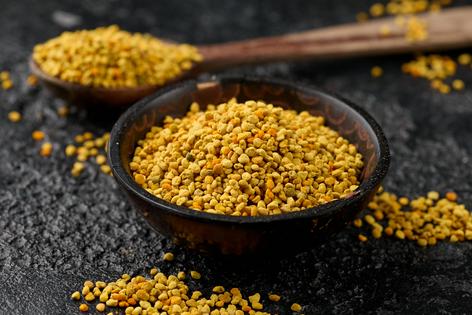Environmental Nutrition: Spotlight on supplements: bee pollen
With their talents for making things including honey and hives, few people question the origins of the phrase “busy as a bee.” But, what are the benefits of some of their creations, including bee pollen? EN dives into why bee pollen is creating a buzz as a supplement.
Background
In addition to honey, honeybees produce many byproducts, including beeswax, bee venom, royal jelly, propolis and bee pollen. Honeybees collect pollen from plants, mix it with a small amount of saliva or nectar, and place it in “baskets” on their hind legs. The field or worker bees collect and transport the bee pollen to the hive. It is estimated that a colony of bees can collect between 50 and 250 grams of pollen per day (~15 to 45 kilograms or ~33 to 99 pounds of bee pollen per year)!
The composition of bee pollen can vary widely since it is sourced from different plant species, geographies, and seasons. Bee pollen has an extensive history of use in traditional medicine, especially in Traditional Chinese Medicine and in Ayurvedic practices. Bee pollen is estimated to contain more than 200 bioactive substances, including nutrients, amino acids, vitamins, lipids, enzymes, and antioxidants.
Evidence
Likely due to the content of polyphenols in bee pollen, cell and animal studies demonstrate significant antioxidant and anti-inflammatory effects. To date, data from clinical trials is limited and not conclusive. Additional research is required to better determine the therapeutic role of use of bee pollen in human health, especially for allergies, inflammatory conditions, and antibacterial effects.
Safety and side effects
In recent years, the FDA removed several supplements that contained bee pollen from the market over concerns of mislabeled or prohibited ingredients. Whether purchased at a health store or from the local beekeeper, be sure that you buy from a reputable source to help ensure safety. Although not all side effects are known, bee pollen is thought to be possibly safe and well-tolerated for most individuals in the short-term (30 days or less). Bee pollen allergies are rare but those who are allergic can experience serious or adverse reactions, such as itching, swelling, shortness of breath, or anaphylaxis. Please avoid if you have an allergy to certain types of pollen.
Interactions
Bee pollen might increase the effect of anticoagulants (warfarin) or may result in increased bleeding or bruising. As with any new diet or supplement regimen, please consult with your physician to discuss if supplementing with bee pollen may be appropriate for you.
(Environmental Nutrition is the award-winning independent newsletter written by nutrition experts dedicated to providing readers up-to-date, accurate information about health and nutrition in clear, concise English. For more information, visit www.environmentalnutrition.com.)
©2024 Belvoir Media Group, LLC. Distributed by Tribune Content Agency, LLC.











Comments